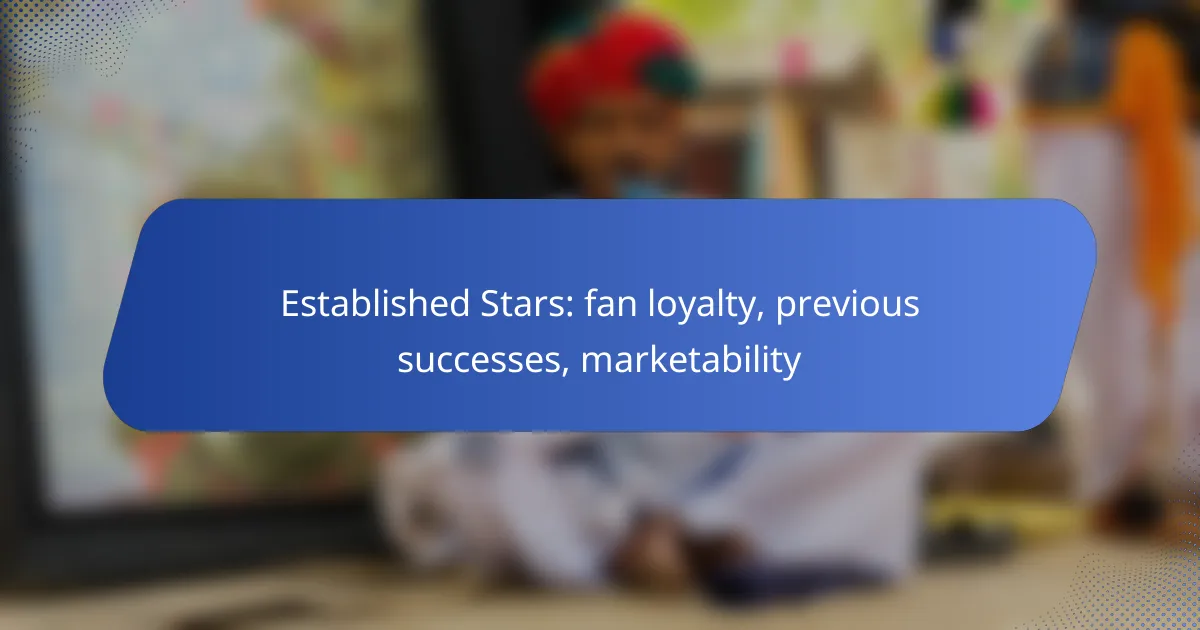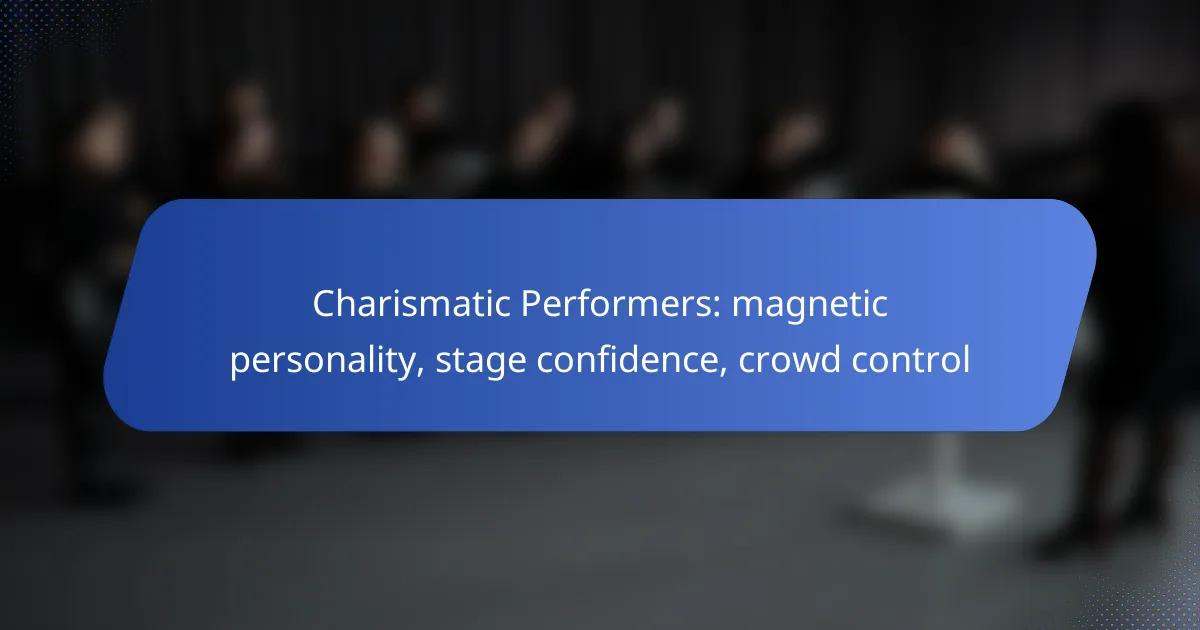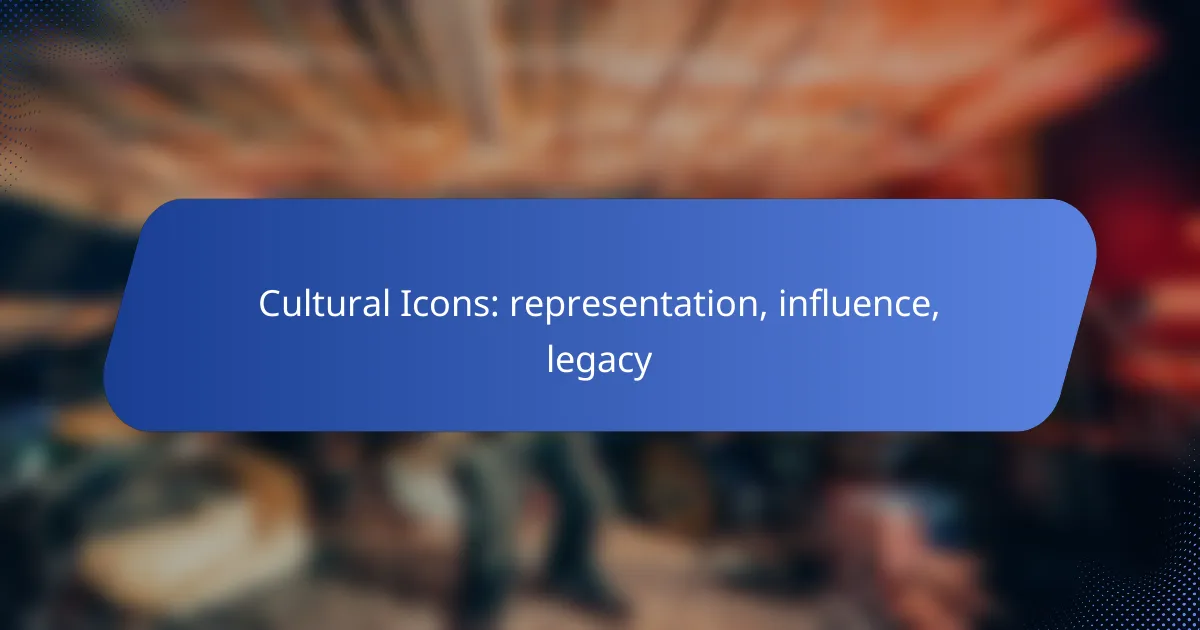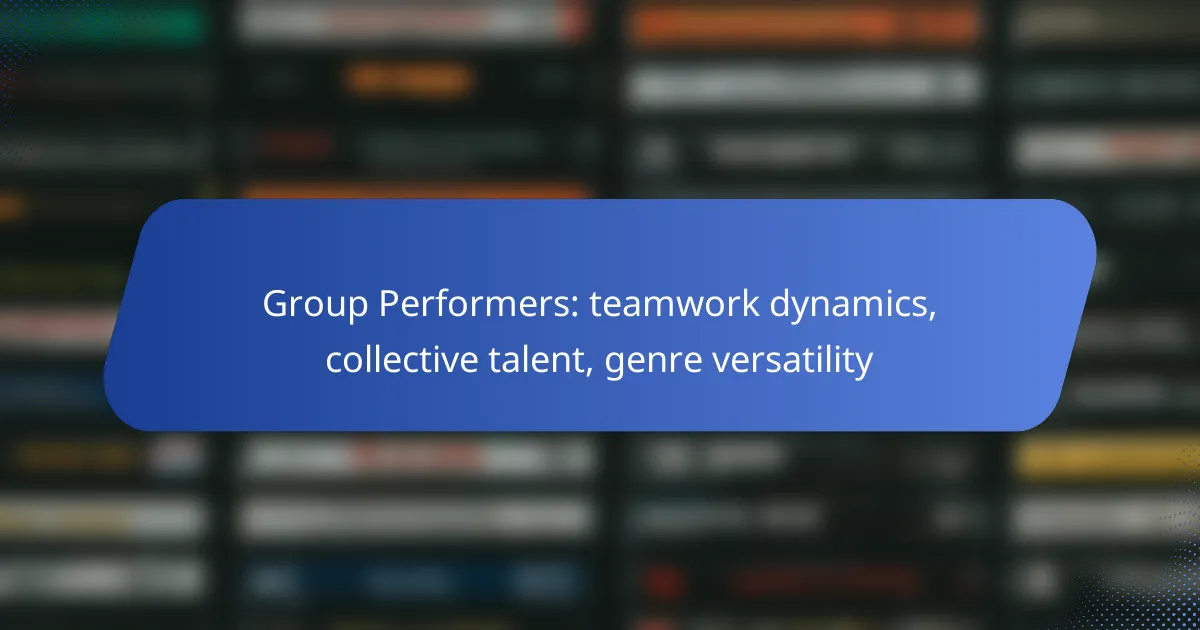Established stars leverage their fan loyalty and previous successes to enhance their marketability in the entertainment industry. By engaging with fans and fostering emotional connections, they maintain a dedicated following that translates into commercial opportunities. Their track record of awards and critical acclaim not only solidifies their brand identity but also makes them highly sought after for various projects.

How do established stars maintain fan loyalty?
Established stars maintain fan loyalty through consistent engagement, exclusive offerings, and personal interactions. These strategies help create a strong emotional connection with fans, reinforcing their dedication over time.
Engagement through social media
Social media platforms are vital for established stars to connect with their fans. By sharing updates, behind-the-scenes content, and personal insights, stars can foster a sense of intimacy and community. Regular interaction, such as responding to comments or hosting live Q&A sessions, enhances this relationship.
Stars often utilize platforms like Instagram, Twitter, and TikTok to reach different demographics. Tailoring content to each platform’s audience can significantly boost engagement and loyalty.
Exclusive content and merchandise
Offering exclusive content and merchandise is a powerful way to reward loyal fans. This can include limited-edition items, early access to new releases, or unique digital content such as unreleased tracks or behind-the-scenes footage. Such exclusivity creates a sense of belonging among fans.
Merchandise can range from apparel to collectibles, often priced to reflect their unique status. Stars should consider seasonal promotions or collaborations to keep offerings fresh and appealing.
Fan events and meet-and-greets
Fan events and meet-and-greets provide opportunities for direct interaction, which can significantly enhance loyalty. These events allow fans to connect with their favorite stars in a personal setting, creating memorable experiences that deepen their attachment.
Stars can host events in various formats, from intimate gatherings to large conventions. Offering tiered experiences, such as VIP access, can cater to different fan segments and maximize engagement.

What previous successes contribute to marketability?
Previous successes such as awards, box office hits, and critical acclaim significantly enhance a star’s marketability. These achievements create a strong brand identity, attracting both fans and industry opportunities.
Award-winning performances
Award-winning performances, including Oscars, Grammys, and other prestigious accolades, establish credibility and recognition in the entertainment industry. Stars with multiple awards often enjoy increased visibility and demand for their work.
For example, an actor who has won an Academy Award is likely to be seen as a top choice for leading roles, which can lead to higher salaries and more lucrative contracts. This recognition can also translate into endorsement deals and partnerships.
High-grossing films and albums
High-grossing films and albums serve as a clear indicator of a star’s popularity and marketability. Projects that achieve significant box office success or record sales demonstrate a strong fan base and commercial viability.
For instance, a musician whose album sells millions of copies or an actor starring in a blockbuster film can leverage this success to negotiate better deals in future projects. These financial achievements often attract sponsors and collaborations with brands looking to capitalize on the star’s popularity.
Critical acclaim and fan favorites
Critical acclaim, alongside a loyal fan base, plays a crucial role in a star’s marketability. Positive reviews from critics can elevate a star’s status and lead to more opportunities in diverse roles or projects.
Moreover, films or albums that resonate with audiences often create a lasting connection, fostering a dedicated fan following. This loyalty can translate into sustained support for future endeavors, making the star a valuable asset in the entertainment market.

How does marketability impact established stars?
Marketability significantly enhances the visibility and profitability of established stars. Their previous successes and fan loyalty create a strong foundation for attracting lucrative opportunities, making them highly sought after in various commercial ventures.
Brand partnerships and endorsements
Established stars often engage in brand partnerships and endorsements, leveraging their popularity to promote products and services. These collaborations can result in substantial financial rewards, sometimes reaching millions of dollars per deal. Brands benefit from the star’s loyal fan base, which can lead to increased sales and brand recognition.
For example, a well-known athlete might endorse a sports drink, leading to a spike in sales during the campaign period. It’s crucial for stars to choose partnerships that align with their personal brand to maintain authenticity and trust with their audience.
Increased ticket sales and viewership
The marketability of established stars directly correlates with increased ticket sales and viewership for events. Fans are more likely to attend games, concerts, or shows featuring their favorite stars, resulting in higher attendance rates. This can translate into significant revenue boosts for organizers and venues.
For instance, a concert headlined by a popular artist can sell out quickly, often leading to secondary market prices that soar. Event promoters should capitalize on the star’s marketability by implementing targeted marketing strategies to maximize attendance.
Social media influence and reach
Social media plays a vital role in amplifying the marketability of established stars. Their large followings allow them to reach millions of fans instantly, making platforms like Instagram and Twitter powerful tools for promotion. Engaging content can enhance their visibility and strengthen fan loyalty.
Stars can use social media to share behind-the-scenes moments, promote upcoming projects, or interact with fans, fostering a sense of community. However, they should be mindful of their online presence, as negative interactions can impact their marketability and brand image. Regularly assessing engagement metrics can help stars refine their social media strategies for better results.

What criteria determine fan loyalty?
Fan loyalty is primarily influenced by the consistency of an artist’s work, their authenticity, and how relatable they are to their audience. These factors create a strong emotional connection, encouraging fans to support the artist over time.
Consistency in quality of work
Consistency in the quality of an artist’s work is crucial for maintaining fan loyalty. Fans expect a certain standard, and when artists deliver high-quality performances or releases consistently, it reinforces trust and admiration. For instance, musicians who regularly produce chart-topping albums or athletes who consistently perform well are more likely to retain their fan base.
To build this consistency, artists should focus on honing their skills and maintaining a reliable output schedule. This might mean setting realistic goals for new releases or performances, ensuring they do not compromise on quality for quantity.
Authenticity and relatability
Authenticity and relatability play significant roles in fostering fan loyalty. When fans perceive an artist as genuine and true to themselves, they are more likely to form a deeper emotional connection. This connection can be enhanced through personal storytelling, social media engagement, or community involvement.
Artists should strive to share their personal journeys and challenges, making them more relatable to fans. For example, a celebrity who openly discusses their struggles with mental health can resonate with fans facing similar issues, thereby strengthening loyalty. Engaging with fans through Q&A sessions or live events can also enhance this sense of connection.

How do established stars leverage previous successes?
Established stars leverage their previous successes by building a recognizable personal brand and utilizing their past achievements in marketing strategies. This approach not only enhances their marketability but also fosters strong fan loyalty, creating a cycle of continued success.
Building a strong personal brand
A strong personal brand is essential for established stars as it differentiates them in a crowded market. This brand is often built on their unique personality, values, and public image, which resonate with fans and attract new audiences. For instance, a star known for philanthropy may leverage that image to connect with socially conscious consumers.
To cultivate a personal brand, stars should consistently engage with their audience through social media, public appearances, and collaborations. Authenticity is key; fans appreciate transparency and relatability, which can enhance loyalty and trust.
Utilizing past achievements in marketing
Established stars can effectively use their past achievements to enhance their marketing efforts. By highlighting awards, successful projects, or notable collaborations, they create a narrative that reinforces their credibility and appeal. For example, a musician with multiple Grammy Awards may use this recognition in promotional materials to attract new listeners.
Additionally, leveraging past successes can involve strategic partnerships with brands that align with their image. Stars should consider how their history can enhance brand campaigns, ensuring that their achievements resonate with the target audience. This tactic not only boosts visibility but also reinforces the star’s marketability in a competitive landscape.

What emerging trends affect fan loyalty?
Emerging trends significantly influence fan loyalty by shaping how fans engage with their favorite stars and teams. Factors such as social media presence, personalized experiences, and community involvement are increasingly important in maintaining and growing this loyalty.
Social Media Engagement
Social media platforms have transformed the way fans connect with stars. Athletes and entertainers who actively engage with their audience through platforms like Instagram and Twitter can foster a sense of community and belonging among fans. Regular updates, behind-the-scenes content, and direct interactions can enhance loyalty.
For example, a star who shares personal stories or responds to fan comments can create a more intimate relationship, making fans feel valued and appreciated. This engagement can lead to increased support during events and higher merchandise sales.
Personalized Experiences
Fans increasingly expect personalized experiences that cater to their preferences. This can include tailored content, exclusive access to events, or customized merchandise. By leveraging data analytics, stars and teams can offer unique experiences that resonate with individual fans.
For instance, a sports team might provide personalized ticket packages based on a fan’s previous attendance or preferences. Such targeted approaches can significantly enhance fan loyalty by making supporters feel recognized and special.
Community Involvement
Community involvement plays a crucial role in building fan loyalty. Stars who actively participate in local events or charitable initiatives can strengthen their connection with fans. This engagement demonstrates a commitment to the community and can foster a deeper emotional bond.
For example, a musician who holds free concerts for local charities or a sports player who volunteers at youth camps can enhance their image and loyalty among fans. Such actions not only improve public perception but also encourage fans to support them more passionately.










